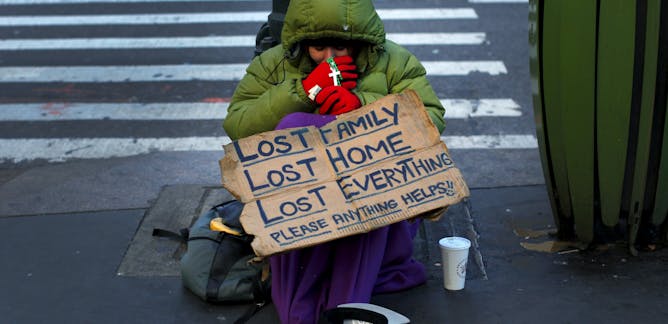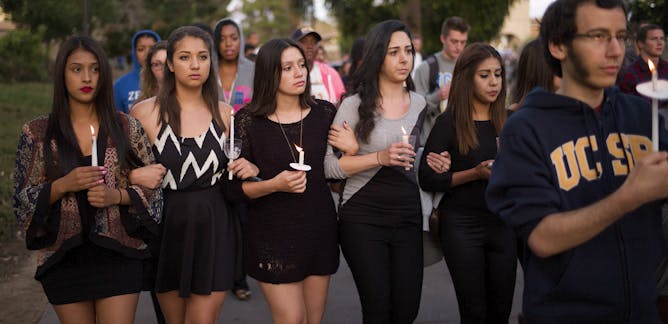|
|
|
Editor's note
|
|
The suicides this week of Kate Spade and Anthony Bourdain saddened and shocked people to their core. How could someone who is so successful and deeply loved feel so despondent? Florida State University scholar Joseph Franklin explains why “we can only predict who is going to die by suicide slightly more accurately than random guessing.”
Last month, the boy band BTS became the first Korean pop group to have an album top the Billboard charts. So how did BTS succeed in the U.S., a country where other K-pop groups have historically struggled to attract a following? The University of Oregon’s Susanna Lim argues this says as much about their talent as it does about Korea’s expanding role in global affairs.
President Trump has been briefly in Quebec this weekend, attending the most controversial G-7 summit in years. That’s mostly because his recent foreign policy decisions, particularly on trade, have been inconsistent and alarming to allies, argues Georgia State’s Charles Hankla. The political scientist explores whether there’s a method to the madness – or whether it’s just madness.
And, finally, we want to know what you think about The Conversation. How do we compare to other news sources you read? Are there ways we could improve? Please take a few moments to give us your feedback (and note that we are focussing this year particularly on our science coverage, at the request of one of our funders).
|
Lynne Anderson
Health + Medicine Editor
|

|
|
Top stories
|

Anthony Bourdain, left, and Kate Spade, right.
The Conversation with images from PeabodyAwards/flickr
Joseph Franklin, Florida State University
The suicides this week of Kate Spade and Anthony Bourdain shocked and saddened many. And the news was disturbing. Why is it so hard to know who might commit suicide?
|

BTS performs ‘Fake Love’ at the Billboard Music Awards on May 20, 2018.
Chris Pizzello/Invision/AP
Susanna Lim, University of Oregon
K-pop has been hugely popular in Asia, but has never able to catch on in the U.S. – until BTS topped the Billboard 200.
|

Trump answers questions before departing the White House on his way to the G7 in Quebec.
Reuters/Kevin Lamarque
Charles Hankla, Georgia State University
Trump's unpredictable and inconsistent policies will have consequences as the president faces down allies at the G7 over trade and Kim Jong Un in Singapore over nukes.
|
Politics + Society
|

Michael Rowe, Yale University; Charles Barber, Wesleyan University
Solving homelessness doesn't just mean finding someone a physical home. A program run in New Haven, Connecticut, focuses on helping people see themselves as members of their communities – as citizens.
| |

Stephanie L. Canizales, Texas A&M University
Interviews with hundreds of unaccompanied minors in Los Angeles reveal that relationships with US sponsors can be complicated.
|
|
|
Ethics + Religion
|

John Fea, Messiah College
The American Bible Society, with an annual revenue of nearly $370 million, is one of the largest religious nonprofits, and a highly influential one.
| |

Ross Haenfler, Grinnell College
Incels compare themselves to other men, before blaming women for withholding sex from, in their perception, deserving men.
|
|
|
Economy + Business
|

Christian Weller, University of Massachusetts Boston
Social Security will have to dip into its trust fund to pay benefits this year for the first time since 1982. Should we be worried?
| |

Margaret E. Johnson, University of Baltimore
Courts have created three legal barriers that have made it much harder for workers to complain to their employers about sexual harassment.
|
|
|
Environment + Energy
|

Brad Daniel, Montreat College; Andrew Bobilya, Western Carolina University; Ken Kalisch, Montreat College
Many studies have shown that time outdoors is good for our physical health. Three wilderness education experts explain why periods alone in nature also provide mental and spiritual benefits.
| |

Scott L. Montgomery, University of Washington
Advanced small modular reactors, known as SMRs, will probably have many advantages over older technology. But it's not yet known how they will stack up against other sources of electricity.
|
|
|
Education
|

David Pimentel, University of Idaho
Utah's new 'free-range' parenting law restores certain rights to parents regarding when they can leave their children unattended. But does the law go too far or not far enough?
| |

Jack Marr, Boise State University
The Trump administration’s plans to restrict visas for Chinese students to curtail intellectual property theft may be necessary, but could also scare away talent, a U.S-China relations expert warns.
|
|
|
Health + Medicine
|

Richard Gunderman, Indiana University
As the documentary about 'Mister Rogers' Neighborhood' hits theaters today, it's worth noting that Rogers' emphasis on kindness and love is proving to be very important to good health. Here's why.
| |

Catherine Gillespie, Drake University
In a diet-obsessed culture, eating disorders pose a severe threat. While the reasons for the disorders are varied, a consistent approach in treatment can help people stop dieting and feel safe.
|
|
|
Science + Technology
|

David R. Johnson, University of Nevada, Reno
Money always seems tight for university scientists. A sociologist conducted hundreds of interviews to see how they think about funding sources and profit motives for basic and applied research.
| |

Adam Bargteil, University of Maryland, Baltimore County
The first time computer-generated characters interacted with humans on a movie screen was 25 years ago, in 'Jurassic Park.' Since then, technology has improved, giving directors more choices.
|
|
|
Arts + Culture
|

M. Berk Talay, University of Massachusetts Lowell
For 30 years, it’s been the best-selling vehicle in the US.
| |

Allison Skinner, Northwestern University
Dehumanizing insults have become more common in political discourse. Psychology research has shown that they can prime us for violence – and even change our brains.
|
|
|
| |
| |
| |
| |
| |
| |
|
|
|
|
|
|
|